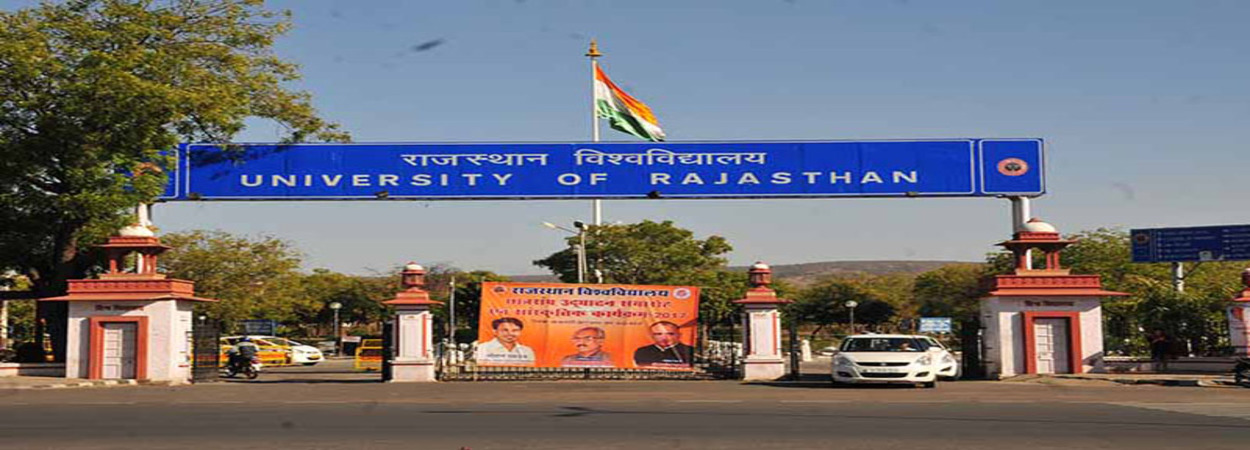Introduction about Ph.D. From Sardar Patel University
Sardar Patel University (SPU), located in the vibrant town of Vallabh Vidyanagar in Gujarat, is a prestigious institution known for its commitment to academic excellence, research, and community development. Established in 1955, the University has steadily evolved into a hub for interdisciplinary learning, offering a diverse range of undergraduate, postgraduate, and doctoral programs. Pursuing a Ph.D. at SPU opens the door to immersive research opportunities guided by experienced faculty members who are leaders in their respective fields. Over the years, Sardar Patel University has fostered a research ecosystem that prioritizes innovation, critical thinking, and societal relevance. Doctoral candidates benefit from state-of-the-art facilities, such as well-equipped libraries, advanced laboratories, and specialized research centers. Whether you are interested in sciences, humanities, commerce, education, or management studies, SPU provides a supportive environment that encourages interdisciplinary collaboration and creative problem-solving. The Ph.D. program at SPU is meticulously designed to ensure a balance between theoretical foundations and practical research skills. Students are encouraged to engage in seminars, workshops, and conferences to broaden their academic horizons and stay abreast of global research trends. Additionally, the University’s collaborations with industry, government bodies, and international institutions open up avenues for cross-cultural learning and valuable networking. A Ph.D. from Sardar Patel University not only enriches your academic credentials but also enhances your professional outlook, equipping you with the expertise needed to address contemporary challenges in your chosen field. Whether your goal is to embark on an academic career, pursue advanced research in a corporate setting, or contribute to policy-making, SPU’s doctoral program offers a transformative journey that helps you achieve these objectives while upholding the values of integrity, inclusivity, and social responsibility.
Fee Structure for Ph.D. in Sardar Patel University
| Particulars | Tuition Fee Per Year (Approx.) | Registration Fee (One-Time) | Total Fee (Approx.) |
|---|---|---|---|
| Ph.D. Program | INR 70,000 | INR 10,000 | INR 2,20,000 |
Admission Process For Ph.D. in Sardar Patel University
The admission procedure for the Ph.D. program at Sardar Patel University is designed to identify and nurture scholars who exhibit strong academic potential, research inclination, and a commitment to contributing new knowledge in their fields. Below is a simplified outline of the steps involved:
- Check Eligibility: Ensure you meet the minimum eligibility criteria, typically a Master’s degree or equivalent in a relevant subject area, with a minimum required percentage or CGPA.
- Obtain Application Form: The application form can be accessed from the University’s official website or purchased directly from the admissions office on campus.
- Entrance Examination: Most applicants are required to sit for the Ph.D. entrance exam conducted by SPU. Candidates with national-level fellowships or qualifying scores (e.g., UGC-NET/JRF) may receive exemptions.
- Interview/Presentation: Shortlisted candidates are typically invited for an interview, where they may present their research proposal or discuss their areas of interest with a panel of experts.
- Final Selection: Admissions are based on performance in the entrance exam, interview, and past academic achievements. Successful applicants receive an offer letter specifying the enrollment and fee payment deadlines.
Ph.D. Subjects in Sardar Patel University
| Faculty/Area | Specializations |
|---|---|
| Science | Physics, Chemistry, Botany, Zoology, Mathematics, Microbiology, Biotechnology |
| Arts & Humanities | English, Hindi, Sanskrit, History, Political Science, Psychology, Sociology |
| Commerce & Management | Accounting, Finance, Marketing, Human Resources, Economics, Business Administration |
| Education | Curriculum Studies, Educational Psychology, Educational Technology, Teacher Education |
| Home Science | Food & Nutrition, Family Resource Management, Human Development |
| Pharmaceutical Sciences | Pharmacology, Pharmaceutics, Pharmacognosy, Pharmaceutical Chemistry |
Document Required For Ph.D. in Sardar Patel University
Compiling the necessary documents in advance can expedite your application process and prevent last-minute hurdles. Ensure all your documents are up-to-date, valid, and attested as per the University guidelines. Below is a list of commonly required documents for Ph.D. admissions at Sardar Patel University:
- Completed Ph.D. application form (online or offline).
- Mark sheets and degree certificates of Bachelor’s and Master’s programs.
- Proof of date of birth (Birth Certificate, Passport, or valid government-issued ID).
- Migration or Transfer Certificate from the previous institution.
- Copy of entrance exam scorecard (if applicable) or fellowship award letter.
- Research proposal or statement of purpose (if required by the department).
- Proof of category/reservation (if claiming under SC/ST/OBC/EWS or other quotas).
- Recent passport-size photographs (usually 2-4 in number).
- Any other document mentioned in the official admission notification.
Sardar Patel University Ph.D. Syllabus
| Semester / Phase | Coursework Components |
|---|---|
| Semester 1 | Advanced Research Methodology | Literature Review Techniques | Subject-Specific Theoretical Framework |
| Semester 2 | Elective Papers (Based on Specialization) | Data Collection & Analysis Tools | Research Ethics & Proposal Development |
| Semester 3 | Comprehensive Examination | Proposal Defense | Scholarly Writing & Academic Presentations |
| Semester 4 & Beyond | Fieldwork / Lab Work | Thesis Drafting | Research Paper Publication | Final Dissertation Submission & Viva-Voce |
Sardar Patel University Research Methodology
- Defining Research Goals: Identifying clear research objectives and formulating testable hypotheses relevant to your field.
- Literature Survey: Conducting a thorough review of existing studies, journals, and databases to understand research gaps.
- Methodological Framework: Deciding on qualitative, quantitative, or mixed-method approaches that best suit the research questions.
- Data Collection & Analysis: Employing surveys, experiments, archival research, or advanced statistical tools, depending on the nature of the study.
- Validation & Reliability: Ensuring that research findings are reliable, repeatable, and adhere to ethical standards.
- Ongoing Review: Engaging with faculty supervisors and peer groups for feedback and refinement of methodologies.
- Presentation & Publication: Sharing preliminary findings in seminars, workshops, or journals to validate your research approach.
- Final Report: Structuring your dissertation logically with a clear introduction, methodology, results, discussion, and references.
Sardar Patel University Highlights
| Feature | Description |
|---|---|
| Location | Vallabh Vidyanagar, Gujarat |
| Established | 1955 |
| Recognition | UGC Approved, NAAC Accredited |
| Faculties | Science, Arts, Commerce, Management, Education, Home Science, Pharmaceutical Sciences |
| Campus Facilities | Modern Labs, Digital Libraries, Research Centres, Hostels, Sports Complex |
| Research Collaborations | National & International Partnerships, Industry Tie-ups, Government Projects |
| Seminars & Workshops | Regular Academic Events, Conferences, Guest Lectures, Faculty Development Programs |
| Student Support | Career Guidance, Counselling Cells, Scholarships, Research Grants |
| Notable Alumni | Academicians, Industry Professionals, Entrepreneurs in Various Sectors |
| Mode of Study | Full-Time and Part-Time Ph.D. Options |
How To Apply For Ph.D. in Sardar Patel University
- Visit Official Website: Start by visiting the University’s official portal and locate the “Ph.D. Admissions” section.
- Check Notifications: Read the latest admission guidelines, important dates, and eligibility criteria carefully.
- Register Online: Create a user account using your email ID and mobile number, then complete the registration process.
- Fill Application Form: Provide personal details, academic records, and other required information. Upload scanned copies of necessary documents.
- Pay Application Fee: Pay the applicable fee online (via credit card, debit card, or net banking) or offline (if such an option is available).
- Entrance Examination: Note down the exam date, syllabus, and venue (if you do not have any fellowship-based exemption).
- Download Admit Card: Keep a copy of your admit card for the entrance exam (if applicable), ensuring all details are correct.
- Attend Interview: If shortlisted, prepare to discuss your research interests, methodology, and proposed objectives with the selection panel.
- Accept Offer: Once selected, pay the requisite fees and follow the guidelines mentioned in your admission letter to finalize enrollment.
- Register & Begin: Complete any pending registration formalities and commence your doctoral journey at SPU.
Courses After Ph.D. in Sardar Patel University
- Post-Doctoral Fellowships (National & International)
- Advanced Diplomas or Certifications in Specialized Research Tools (e.g., Bioinformatics, Data Analytics)
- Professional Courses in Intellectual Property Rights & Patents
- Leadership & Management Programs for Academic Administrators
- Faculty Development Programs & Specialized Teaching Certifications
Sardar Patel University Scholarship
Sardar Patel University is committed to making quality education and research accessible to a broad range of students. To achieve this, the University, in collaboration with government bodies and private organizations, offers various scholarship programs aimed at acknowledging academic excellence and supporting financially constrained scholars. These scholarships are not limited to a single discipline, thereby ensuring that talent from every domain — whether scientific, artistic, or professional — is encouraged. This financial assistance may come in the form of complete or partial tuition fee waivers, fellowships, stipends, or grants for research-related expenses. In some instances, candidates also benefit from industry-sponsored funding that aligns with the University’s emphasis on applied, impactful research. Students interested in availing these scholarships are advised to regularly check official notifications and maintain high academic performance throughout the course of study.
- Merit-Based Scholarships: For those with outstanding academic records.
- Need-Based Financial Aid: For students from economically weaker sections.
- Government Schemes: Central and state scholarships or fellowships like UGC-NET/JRF.
- Industry-Sponsored Grants: Funding from corporate entities aligned with particular research themes.
Sardar Patel University FAQ's Regarding Ph.D.
- Q1: What is the minimum eligibility for a Ph.D. at SPU?
A1: A Master’s degree in a relevant field with the required percentage or CGPA. Certain departments may have additional eligibility criteria or screening tests. - Q2: Does SPU offer part-time Ph.D. programs?
A2: Yes, depending on the department. Part-time enrollments are often available for working professionals who can satisfy stipulated requirements, including minimum contact hours. - Q3: Is a UGC-NET or GATE score necessary?
A3: While a UGC-NET or GATE score can provide exemption from certain entrance exams, it may not be mandatory for all departments. Check the official guidelines for specifics. - Q4: How long does it usually take to complete a Ph.D. at SPU?
A4: Typically between three to five years. This duration may extend based on research complexity, part-time enrollment, or other academic factors. - Q5: What research facilities are available at SPU?
A5: The University houses modern labs, libraries, specialized research centers, and computer facilities. Collaborative projects with industries and government agencies also enrich the research environment. - Q6: Can I change my research topic after enrollment?
A6: Minor adjustments are often permitted, but substantial changes generally require formal approval from your supervisor and the doctoral committee. - Q7: Are scholarships renewable each year?
A7: Many scholarships are subject to annual renewal based on academic performance and satisfactory progress in research. - Q8: Does SPU encourage interdisciplinary research?
A8: Absolutely. Interdisciplinary projects are increasingly important, and SPU supports collaborations across faculties for holistic and impactful research. - Q9: What career avenues open up after completing a Ph.D.?
A9: Graduates often pursue academic careers, research and development roles in industry, policy-making positions, or entrepreneurship leveraging specialized expertise. - Q10: How can I stay updated on admission deadlines and notifications?
A10: Keep an eye on the official SPU website, subscribe to their newsletter, or reach out to the admission office for regular updates regarding application cycles.















